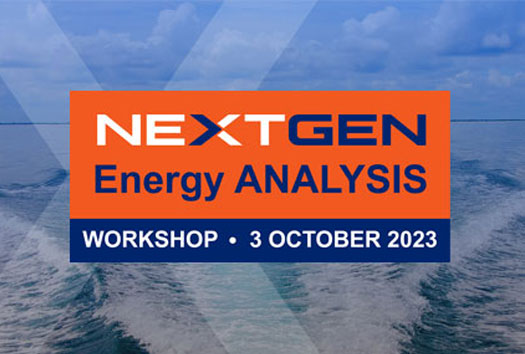
Published on: 14 September 2023

British Marine Member NEXT GEN has three upcoming seminars exploring various future propulsion and vessel energy uses with discounted prices for British Marine members:
NEXT GEN Energy ANALYSIS Workshop via Teams
3 October 2023 via TEAMS on 3 October – 13.00 to 17.00
Expert presenters and dynamic panel discussions will examine the options for measuring, analysing and optimising energy use. With focus on sub 24m vessels, this knowledge will also be highly relevant for vessels in the 25m to 100m range.
Metrics support decisions. Operations and engineering teams need standard methods to compare innovative energy technology with traditional fuels. Technology developers need to understand what targets they have to achieve.
NEXT GEN Workshop Lead, John Haynes: “From running Energy Transition training for significant maritime organisations it is clear there is an urgent need to measure current fuel use and compare alternatives for all sectors of the marine industry. It is essential to establish which analysis methods are viable – plus how real-world duty cycles and use cases fit with different forms of energy data.”
The drive for alternative marine fuels and energy is gaining pace. NEXT GEN highlights effective solutions for workboats, ferries, patrol craft, military vessels, SAR, wind farm and offshore support, superyachts.
The unique knowledge gained from NEXT GEN workshops helps to shape real world decisions, from modifying in-service powertrains to shaping requirements for next generation vessels. Attendees include commercial, government and military organisations, boat builders, engine manufacturers, technology developers, engineers, naval architects, class societies and legislators.
NEXT GEN Energy ANALYSIS topics include:
- Benchmarking current energy use linked to operations
- Measuring, analysing and optimising fuel and energy use
- Real time vessel performance monitoring and control solutions
- Decision making tools for vessel efficiency and engineering condition
- Simple analogue methods versus intelligent predictive planning
- Using data to reduce fuel consumption and emissions
- Remote monitoring for crewed and uncrewed vessels
- Identifying technology that can be installed on vessels today
INFORMATION
- Date: 3 October 2023 – 13.00 to 17.00 (UK) via Teams
- Course: NEXT GEN Energy ANALYSIS
- Standard Rate: £120 – See NEXT GEN Register
- Discount Rate: £95 – British Marine / RINA / IMarEST / UKHMA
- Includes: CPD Certificate
- Organiser: Claire Donnelly claire@shockmitigation.com
- Website: www.nextgen-marine.com
NEXT GEN Marine ENERGY Training
17 October 2023 – Grand Harbour Southampton
This unique one-day course is designed to be relevant to ALL stakeholders involved in energy transition. This includes the professional, commercial and leisure marine industries. Also applicable to original equipment manufacturers, distributors, boat builders, refit yards, engineers, naval architects, ports and marinas.
NEXT GEN Training Lead, John Haynes: “We developed NEXT GEN Marine ENERGY in response to the need for simple, concise information that enables decision makers to plan for energy transition in a changing world. Launched in 2022 and constantly evolving, this cutting edge course has worked really well for significant maritime organisations. Our focus is on viable technology available now or in the near future.”
The aim is to provide awareness of changing energy requirements and the challenges of decarbonising, for both commercial marine and the leisure industry. Focussed on sub 24m vessels, this knowledge is increasingly relevant for vessels in the 25m to 100m range – plus the ports and harbours they operate from.
John Haynes added: “When groups of maritime professionals get together their shared experiences can add to the learning for everyone. Discussions are an important part of our courses and we really like the hard questions! It is great to be running courses in person again and the Grand Harbour is a superb location.”
Session 1: OVERVIEW of Marine Power and Propulsion
- Understanding how energy is evolving differently for fast craft and workboats versus ships.
- Modified ICE / How can we move from Diesel and Petrol to alternative cleaner fuels?
- Why internal combustion engines suit the dynamic maritime workplace.
- UK & EC and international standards linked to energy compliance.
- Understanding the aims and objectives for marine transport. How different sectors are affected.
Session 2: NEXT GENERATION Energy Opportunities and Challenges
- How do we re-power our boat and fast craft fleets in a changing world?
- 100% Battery-Electric – pros and cons / Onshore charging / Battery safety
- What parameters affect 100% battery-electric adoption in ports and at sea?
- Why is Lithium-ion dominant and what can we expect in the near future?
- Parallel or Series Hybrid – mechanical led or electrical led solutions?
Session 3: EMERGING TECHNOLOGY Timelines and Viability for Sub 24m
- Hydrogen as an energy carrier for fuel cell / As dual fuel in ICE / Methanol and Ammonia.
- Regional availability of alternatives / Fuel and Energy Security / Green Corridors.
- How politics and energy instability are accelerating change for marine operators and ports.
- Why infrastructure and energy system Technology Readiness Levels are behind vessel TRLs.
- Timelines and Next Steps / What can we specify now – by 2025 – between 2025 and 2030.
INFORMATION
- Course: NEXT GEN Marine ENERGY
- Date: 17 October 2023 – 09.00 to 16.00
- Location: Grand Harbour Southampton
- Standard Rate: £225. See NEXT GEN Register
- Discount Rate: £200 – British Marine / RINA / IMarEST / UKHMA
- Includes: CPD Certificate / Lunch & refreshments
- Organiser: Claire Donnelly claire@shockmitigation.com
- Website: www.nextgen-marine.com
NEXT GEN Marine HYBRID Training
18 October 2023 – Grand Harbour Southampton
New for 2023, NEXT GEN Marine HYBRID course brings together modified ICE with clean fuels, battery-electric and onshore infrastructure. The aim of innovative hybrid systems is to enhance conventional power and propulsion systems. With these here and now solutions, vessels can reduce emissions and improve fuel consumption – whilst extending engine maintenance periods and engine life.
NEXT GEN Training Lead, John Haynes: “NEXT GEN Marine HYBRID builds on our experience of running a series of hybrid workshops since 2015 and working with literally hundreds of industry experts globally. Our objective has been to identify the potential of new technologies matched to specific applications.”
This unique one-day course is designed for both commercial marine and the leisure industry. Also applicable to original equipment manufacturers, boat builders, refit yards, engineers and naval architects. Focussed on sub 24m vessels, this knowledge is increasingly relevant for 25m to 100m vessels.
The course delivers an independent view on the opportunities and challenges presented by emerging technologies. For end-users and operators, discussions enable attendees to ask questions relevant to their vessel duty cycles and operating profiles. Technology developers can see where they fit into the solution.
Session 1: OVERVIEW of Marine Hybrid and Energy Systems
- How hybrid systems are evolving for different maritime sectors / Lessons from land transport.
- Duty Cycles of Sub 24m Vessels / Range extenders / Modified ICE with alternative fuels.
- Analysing potential hybrid systems – from workboats to fast craft / Realities of energy density.
- Why internal combustion engines plus battery-electric suit multiple maritime roles.
- UK & EC and International Standards / Drivers and Barriers for Hybrid.
Session 2: BATTERY-ELECTRIC Opportunities & Challenges
- Where Battery-Electric fits best / Balancing Speed – Payload – Range / Reducing factors.
- What parameters affect 100% battery-electric adoption / Charging in home ports and away.
- Why Li-ion is dominant now / Pros and cons of various chemistries / What is coming for marine.
- Energy Infrastructure / A systems approach / Availability and demand.
- Why charging and local grid network Technology Readiness Levels are behind vessel TRLs.
Session 3: HYBRID Viability and Timelines for Sub 24m
- Re-Powering existing vessels with Hybrid systems / Individual boats and fleets.
- Maintaining flexibility in a changing world / Lessons learned onboard and onshore.
- Parallel or Series Hybrid – mechanical led versus electrical led solutions / Range extending.
- Real world case studies of re-powering and new builds / Emerging technology
- Timelines and Next Steps / What can we specify now – by 2025 – between 2025 and 2030.
INFORMATION
- Course: NEXT GEN Marine HYBRID
- Date: 18 October 2023 – 09.00 to 16.00
- Location: Grand Harbour Southampton
- Standard Rate: £225 – See NEXT GEN Register
- Discount Rate: £200 – British Marine / RINA / IMarEST / UKHMA
- Includes: CPD Certificate / Lunch & refreshments
- Organiser: Claire Donnelly claire@shockmitigation.com
- Website: www.nextgen-marine.com

